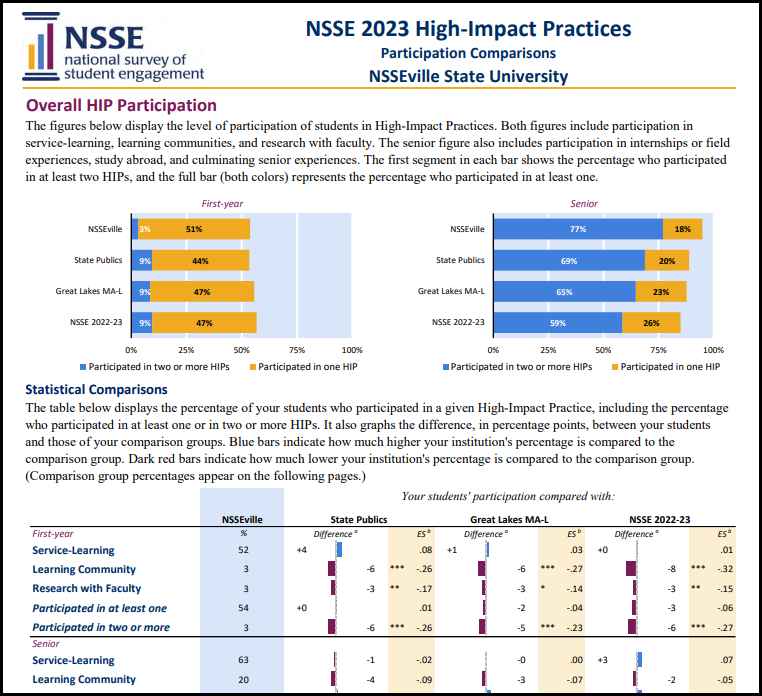
NSSE News & Research






NSSE and FSSE 2024 Surveys Launched and Are in the Field!
NSSE is pleased to announce that the 2024 administrations of NSSE and FSSE have launched and are in the field. 372 participating institutions have registered and customized the NSSE survey to their specific needs and will have access to raw live data downloads in the spring before receiving their administration reports in the summer.

NSSE and FSSE 2024 Surveys Launched and Are in the Field!
NSSE is pleased to announce that the 2024 administrations of NSSE and FSSE have launched and are in the field. 372 participating institutions have registered and customized the NSSE survey to their specific needs and will have access to raw live data downloads in the spring before receiving their administration reports in the summer.

NSSE and FSSE 2024 Surveys Launched and Are in the Field!
NSSE is pleased to announce that the 2024 administrations of NSSE and FSSE have launched and are in the field. 372 participating institutions have registered and customized the NSSE survey to their specific needs and will have access to raw live data downloads in the spring before receiving their administration reports in the summer.

NSSE and FSSE 2024 Surveys Launched and Are in the Field!
NSSE is pleased to announce that the 2024 administrations of NSSE and FSSE have launched and are in the field. 372 participating institutions have registered and customized the NSSE survey to their specific needs and will have access to raw live data downloads in the spring before receiving their administration reports in the summer.

NSSE and FSSE 2024 Surveys Launched and Are in the Field!
NSSE is pleased to announce that the 2024 administrations of NSSE and FSSE have launched and are in the field. 372 participating institutions have registered and customized the NSSE survey to their specific needs and will have access to raw live data downloads in the spring before receiving their administration reports in the summer.






NSSE 2023 Major Field Report Now Available to Participating Institutions
NSSE is pleased to announce that the NSSE Major Field Report 2023—an interactive Tableau-based display—is now available to participating institutions through the Institution Interface. Look for the "NSSE Major Field Report (Tableau)" link in the Data & Reports table. A video tutorial on the new tool is linked from the Start page.

NSSE 2023 Major Field Report Now Available to Participating Institutions
NSSE is pleased to announce that the NSSE Major Field Report 2023—an interactive Tableau-based display—is now available to participating institutions through the Institution Interface. Look for the "NSSE Major Field Report (Tableau)" link in the Data & Reports table. A video tutorial on the new tool is linked from the Start page.

NSSE 2023 Major Field Report Now Available to Participating Institutions
NSSE is pleased to announce that the NSSE Major Field Report 2023—an interactive Tableau-based display—is now available to participating institutions through the Institution Interface. Look for the "NSSE Major Field Report (Tableau)" link in the Data & Reports table. A video tutorial on the new tool is linked from the Start page.

NSSE 2023 Major Field Report Now Available to Participating Institutions
NSSE is pleased to announce that the NSSE Major Field Report 2023—an interactive Tableau-based display—is now available to participating institutions through the Institution Interface. Look for the "NSSE Major Field Report (Tableau)" link in the Data & Reports table. A video tutorial on the new tool is linked from the Start page.

NSSE 2023 Major Field Report Now Available to Participating Institutions
NSSE is pleased to announce that the NSSE Major Field Report 2023—an interactive Tableau-based display—is now available to participating institutions through the Institution Interface. Look for the "NSSE Major Field Report (Tableau)" link in the Data & Reports table. A video tutorial on the new tool is linked from the Start page.

NSSE and FSSE 2024 Surveys Launched and Are in the Field!
NSSE is pleased to announce that the 2024 administrations of NSSE and FSSE have launched and are in the field. 372 participating institutions have registered and customized the NSSE survey to their specific needs and will have access to raw live data downloads in the spring before receiving their administration reports in the summer.

NSSE and FSSE 2024 Surveys Launched and Are in the Field!
NSSE is pleased to announce that the 2024 administrations of NSSE and FSSE have launched and are in the field. 372 participating institutions have registered and customized the NSSE survey to their specific needs and will have access to raw live data downloads in the spring before receiving their administration reports in the summer.

NSSE and FSSE 2024 Surveys Launched and Are in the Field!
NSSE is pleased to announce that the 2024 administrations of NSSE and FSSE have launched and are in the field. 372 participating institutions have registered and customized the NSSE survey to their specific needs and will have access to raw live data downloads in the spring before receiving their administration reports in the summer.

NSSE and FSSE 2024 Surveys Launched and Are in the Field!
NSSE is pleased to announce that the 2024 administrations of NSSE and FSSE have launched and are in the field. 372 participating institutions have registered and customized the NSSE survey to their specific needs and will have access to raw live data downloads in the spring before receiving their administration reports in the summer.

NSSE and FSSE 2024 Surveys Launched and Are in the Field!
NSSE is pleased to announce that the 2024 administrations of NSSE and FSSE have launched and are in the field. 372 participating institutions have registered and customized the NSSE survey to their specific needs and will have access to raw live data downloads in the spring before receiving their administration reports in the summer.

Applying Pluralistic Ignorance to Student Engagement: One Item Set, Two Studies
Pluralistic ignorance generally refers to “erroneous cognitive beliefs shared by two or more individuals about the ideas, feelings, and actions of others” (O’Gorman, 1986, p. 333). This is a classic construct in social psychology, generally known as a means of exploring negative or risky behaviors of college student populations like drug and alcohol use (Suls & Green, 2003) or sexual behaviors (Kuperberg & Padgett, 2017). But how might it relate to a more modern and positive college student experience?

Applying Pluralistic Ignorance to Student Engagement: One Item Set, Two Studies
Pluralistic ignorance generally refers to “erroneous cognitive beliefs shared by two or more individuals about the ideas, feelings, and actions of others” (O’Gorman, 1986, p. 333). This is a classic construct in social psychology, generally known as a means of exploring negative or risky behaviors of college student populations like drug and alcohol use (Suls & Green, 2003) or sexual behaviors (Kuperberg & Padgett, 2017). But how might it relate to a more modern and positive college student experience?

Applying Pluralistic Ignorance to Student Engagement: One Item Set, Two Studies
Pluralistic ignorance generally refers to “erroneous cognitive beliefs shared by two or more individuals about the ideas, feelings, and actions of others” (O’Gorman, 1986, p. 333). This is a classic construct in social psychology, generally known as a means of exploring negative or risky behaviors of college student populations like drug and alcohol use (Suls & Green, 2003) or sexual behaviors (Kuperberg & Padgett, 2017). But how might it relate to a more modern and positive college student experience?

Applying Pluralistic Ignorance to Student Engagement: One Item Set, Two Studies
Pluralistic ignorance generally refers to “erroneous cognitive beliefs shared by two or more individuals about the ideas, feelings, and actions of others” (O’Gorman, 1986, p. 333). This is a classic construct in social psychology, generally known as a means of exploring negative or risky behaviors of college student populations like drug and alcohol use (Suls & Green, 2003) or sexual behaviors (Kuperberg & Padgett, 2017). But how might it relate to a more modern and positive college student experience?

Applying Pluralistic Ignorance to Student Engagement: One Item Set, Two Studies
Pluralistic ignorance generally refers to “erroneous cognitive beliefs shared by two or more individuals about the ideas, feelings, and actions of others” (O’Gorman, 1986, p. 333). This is a classic construct in social psychology, generally known as a means of exploring negative or risky behaviors of college student populations like drug and alcohol use (Suls & Green, 2003) or sexual behaviors (Kuperberg & Padgett, 2017). But how might it relate to a more modern and positive college student experience?

NSSE Accreditation Toolkit Updates: Considerations for Equity & Educational Quality
Accreditation’s dual purpose - upholding standards for educational quality and expectations for continuous improvement in colleges and university - aligns with NSSE goals. As such, many NSSE participating institutions indicate that accrediting agencies are the primary external audience with whom they share their NSSE results. Student engagement results are vital measures of educational quality and can be a stimulus for and evidence of institutional improvement initiatives.

NSSE Accreditation Toolkit Updates: Considerations for Equity & Educational Quality
Accreditation’s dual purpose - upholding standards for educational quality and expectations for continuous improvement in colleges and university - aligns with NSSE goals. As such, many NSSE participating institutions indicate that accrediting agencies are the primary external audience with whom they share their NSSE results. Student engagement results are vital measures of educational quality and can be a stimulus for and evidence of institutional improvement initiatives.

NSSE Accreditation Toolkit Updates: Considerations for Equity & Educational Quality
Accreditation’s dual purpose - upholding standards for educational quality and expectations for continuous improvement in colleges and university - aligns with NSSE goals. As such, many NSSE participating institutions indicate that accrediting agencies are the primary external audience with whom they share their NSSE results. Student engagement results are vital measures of educational quality and can be a stimulus for and evidence of institutional improvement initiatives.

NSSE Accreditation Toolkit Updates: Considerations for Equity & Educational Quality
Accreditation’s dual purpose - upholding standards for educational quality and expectations for continuous improvement in colleges and university - aligns with NSSE goals. As such, many NSSE participating institutions indicate that accrediting agencies are the primary external audience with whom they share their NSSE results. Student engagement results are vital measures of educational quality and can be a stimulus for and evidence of institutional improvement initiatives.

NSSE Accreditation Toolkit Updates: Considerations for Equity & Educational Quality
Accreditation’s dual purpose - upholding standards for educational quality and expectations for continuous improvement in colleges and university - aligns with NSSE goals. As such, many NSSE participating institutions indicate that accrediting agencies are the primary external audience with whom they share their NSSE results. Student engagement results are vital measures of educational quality and can be a stimulus for and evidence of institutional improvement initiatives.






NSSE 2024 Registration Now Open
We are pleased to invite your institution to participate in the 2024 administration of the National Survey of Student Engagement (NSSE).

NSSE 2024 Registration Now Open
We are pleased to invite your institution to participate in the 2024 administration of the National Survey of Student Engagement (NSSE).

NSSE 2024 Registration Now Open
We are pleased to invite your institution to participate in the 2024 administration of the National Survey of Student Engagement (NSSE).

NSSE 2024 Registration Now Open
We are pleased to invite your institution to participate in the 2024 administration of the National Survey of Student Engagement (NSSE).

NSSE 2024 Registration Now Open
We are pleased to invite your institution to participate in the 2024 administration of the National Survey of Student Engagement (NSSE).

NSSE Announces New Director Dr. Leonard Taylor
We are thrilled to announce that Dr. Leonard Taylor will assume the NSSE Director role starting July 1, 2023. The announcement from Indiana University’s School of Education highlights Leonard’s scholarly accomplishments and enthusiasm to begin the role.

NSSE Announces New Director Dr. Leonard Taylor
We are thrilled to announce that Dr. Leonard Taylor will assume the NSSE Director role starting July 1, 2023. The announcement from Indiana University’s School of Education highlights Leonard’s scholarly accomplishments and enthusiasm to begin the role.

NSSE Announces New Director Dr. Leonard Taylor
We are thrilled to announce that Dr. Leonard Taylor will assume the NSSE Director role starting July 1, 2023. The announcement from Indiana University’s School of Education highlights Leonard’s scholarly accomplishments and enthusiasm to begin the role.

NSSE Announces New Director Dr. Leonard Taylor
We are thrilled to announce that Dr. Leonard Taylor will assume the NSSE Director role starting July 1, 2023. The announcement from Indiana University’s School of Education highlights Leonard’s scholarly accomplishments and enthusiasm to begin the role.

NSSE Announces New Director Dr. Leonard Taylor
We are thrilled to announce that Dr. Leonard Taylor will assume the NSSE Director role starting July 1, 2023. The announcement from Indiana University’s School of Education highlights Leonard’s scholarly accomplishments and enthusiasm to begin the role.

